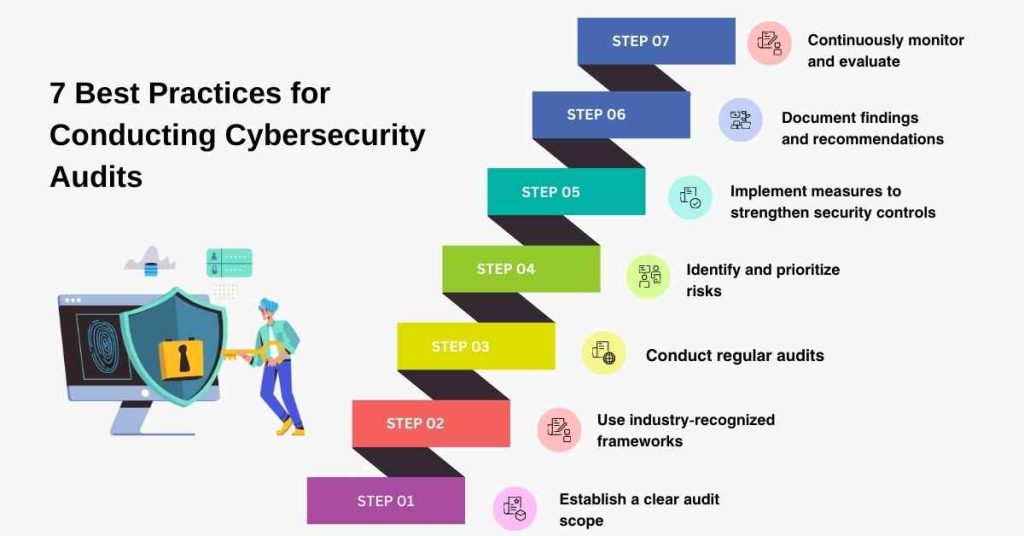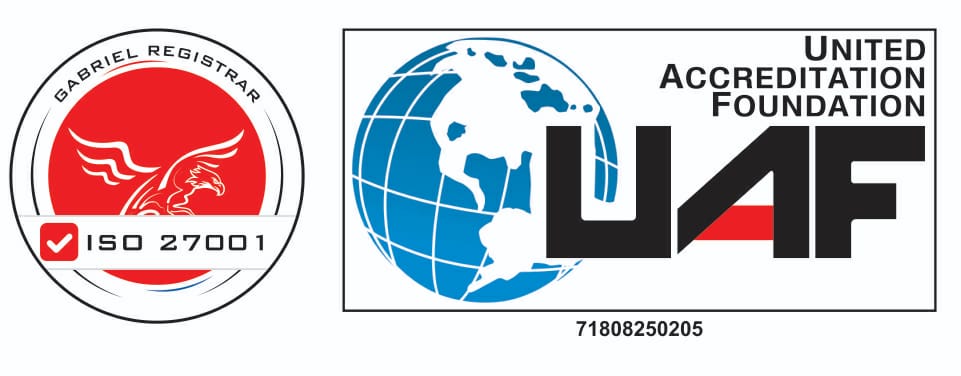Cybersecurity is no longer a luxury, but a necessity for businesses of all sizes. With the increasing number of cyber threats and data breaches, companies are realizing the importance of conducting regular cybersecurity audits to identify and mitigate potential vulnerabilities.
A cybersecurity audit is an essential process that helps organizations evaluate their current security posture and identify areas that require improvement.
In this article, we will explore the top 10 reasons why companies are conducting cybersecurity audits and how it can benefit their business.
List of Top 10 Reasons Why Companies Are Conducting Cybersecurity Audit

Here is the list of the Top 10 Reasons Why Companies Are Conducting Cybersecurity Audit:
1. To Protect Sensitive Data
There are many aims that businesses have for performing cybersecurity audits and one of the most necessary ones is to safeguard an organization’s data from cyber threats. These are the important interests of the company that need to be protected including customer data, financial data, and the data that belong to the organization.
The cybersecurity audit is a useful method enabling an organization to reveal the points of a system or an application that the hacker can penetrate to access sensitive data.
2. To Meet Regulatory Requirements
Most organizations are legally bound to certain guidelines such as GDPR, HIPAA, and PCI DSS that stipulate special security assessments. Any failure to conform to these requirements implies steep penalties, fines an organization’s image deterioration, and loss of consumers.
3. To Reduce Cybersecurity Risks
Businesses both large and small have to be wary of cybersecurity threats at the current time. The primary goal of a cybersecurity audit is to assess threats or dangers in an organization like malware and their provisions to overcome them; for instance, phishing attacks, and ransomware.
4. To Improve Incident Response
Using the results of carrying out a cybersecurity audit, an organization is in a good position to reduce the impact of a cyber-attack or data breach.
A risk assessment would reveal other flaws that can be found in an organization’s incident response plans and processes, through which vulnerabilities resulting from a cyber-attack can be reduced.

5. To Enhance Customer Trust
Today’s customers are concerned with protecting their data from cybercriminals, and they want businesses to do the same. Cybersecurity audit acts as a way through which organisations can prove their preparedness when it comes to cybersecurity as well as their customers’ information.
6. To Reduce Security Costs
An audit of the existing cybersecurity in an organization can help one realise that there are issues that need to be improved and measures to be taken that would mean that the cost of security is reduced.
In this way, firms can minimize the weaknesses they possess and put in place measures that will minimize the risk of such incidents as hacking and leakage of information.
7. To Improve Compliance with Industry Standards
Policies like ISO 27001 are standard within many associations which set frequent cybersecurity inspections and checks mandatory across all industries. Disregarding these standards will lead to a loss of business and reputation.
8. To Identify Vulnerabilities
A cybersecurity audit is a risk analysis of systems and applications that can be breached by hackers to infiltrate an organization’s secure network. This means that they can discover how to improve security control and the likelihood of adequate protection to prevent cyber attacks.
9. To Reduce Downtime
For instance, if there is a crisis such as a cyber-attack or data breach, it means that the business will be closed for some time and this leads to more losses and a reduction of reputation.
Cybersecurity audit gives an overall view of where and how an organization is vulnerable in their incident response plans and procedures, and they can in turn be enhanced in order not to cause a lot of time loss.
10. To Stay Ahead of Cybersecurity Threats
Computers are endangered daily due to the shift in Cybersecurity threats, a new threat being developed daily. Cybersecurity audit enables organizations to protect their systems from cyber threats since it point out the areas that are most vulnerable before putting mechanisms to correct them.
7 Best Practices for Conducting Cybersecurity Audits

To conduct effective cybersecurity audits, companies should follow best practices, including:
1. Establish a clear audit scope
Identify key areas that are to be audited and the systems, applications and data that are within the audit’s sphere.
2. Use industry-recognized frameworks
To accomplish this objective, the audit should be guided by universally acclaimed frameworks like the NIST Cybersecurity Framework.
3. Conduct regular audits
ORGs should perform periodic checkups that would help them detect possible threats in the cybersecurity realm.
4. Identify and prioritize risks
Assess each risk in terms of likelihood resulting in a loss and its potential consequence on the organisation.
5. Implement measures to strengthen security controls
Encourage specific activities toward the improvement of existing security controls including firewalls, IDS and encryption.
6. Document findings and recommendations
Report on analyses and future suggestions on issues that need enhancement.
7. Continuously monitor and evaluate
These recommendations can only be implemented if the security controls are regularly checked for their efficiency.
Summary
Here is the summary of the blog titled Top 10 Reasons Why Companies Are Conducting Cybersecurity Audit.
- To Protect Sensitive Data
- To Meet Regulatory Requirements
- To Reduce Cybersecurity Risks
- To Improve Incident Response
- To Enhance Customer Trust
- To Reduce Security Costs
- To Improve Compliance with Industry Standards
- To Identify Vulnerabilities
- To Reduce Downtime
- To Stay Ahead of Cybersecurity Threats
Conclusion
Conducting regular cybersecurity audits is essential for businesses of all sizes. A cybersecurity audit helps organizations identify vulnerabilities in systems and applications, implement measures to strengthen security controls and reduce the risk of cyber-attacks and data breaches.
FAQs: Top 10 Reasons Why Companies Are Conducting Cybersecurity Audit?
1. What is a cybersecurity audit?
Ans: A cybersecurity audit is a systematic evaluation of an organization’s cybersecurity controls, policies, and procedures to identify vulnerabilities, weaknesses, and areas for improvement. The audit assesses the organization’s ability to detect, prevent, and respond to cybersecurity threats.
2. Why do companies conduct cybersecurity audits?
Ans: Companies conduct cybersecurity audits to identify potential vulnerabilities, demonstrate compliance with regulatory requirements, reduce the risk of cyber-attacks and data breaches, and enhance customer trust.
3. What are the benefits of conducting a cybersecurity audit?
Ans: The benefits of conducting a cybersecurity audit include identifying vulnerabilities and weaknesses, improving incident response plans, reducing security costs, enhancing customer trust, and demonstrating compliance with regulatory requirements.
4. How often should a cybersecurity audit be conducted?
Ans: A cybersecurity audit should be conducted at least annually, but more frequently if the organization is subject to a high level of cyber threat activity or if significant changes have been made to the organization’s systems or applications.
5. Who should conduct a cybersecurity audit?
Ans: A cybersecurity audit should be conducted by qualified cybersecurity professionals who have experience in auditing and testing cybersecurity controls.
6. What is the scope of a cybersecurity audit?
Ans: The scope of a cybersecurity audit includes the evaluation of an organization’s cybersecurity controls, policies, and procedures, including network security, access controls, data encryption, incident response plans, and disaster recovery plans.
7. What are the most common cybersecurity audit findings?
Ans: The most common cybersecurity audit findings include weak passwords, outdated software and systems, inadequate access controls, and a lack of incident response planning.
8. How long does a cybersecurity audit typically take to complete?
Ans: The length of a cybersecurity audit can vary depending on the scope and complexity of the audit, but typically takes several days to several weeks to complete.
9. What are the consequences of not conducting a cybersecurity audit?
Ans: The consequences of not conducting a cybersecurity audit include increased risk of cyber-attacks and data breaches, non-compliance with regulatory requirements, damage to reputation, and financial losses.
10. How can I prepare for a cybersecurity audit?
Ans: To prepare for a cybersecurity audit, you should review your organization’s cybersecurity policies and procedures, ensure that all systems and applications are up to date, and develop a comprehensive incident response plan. You should also identify and address any known vulnerabilities and weaknesses.












